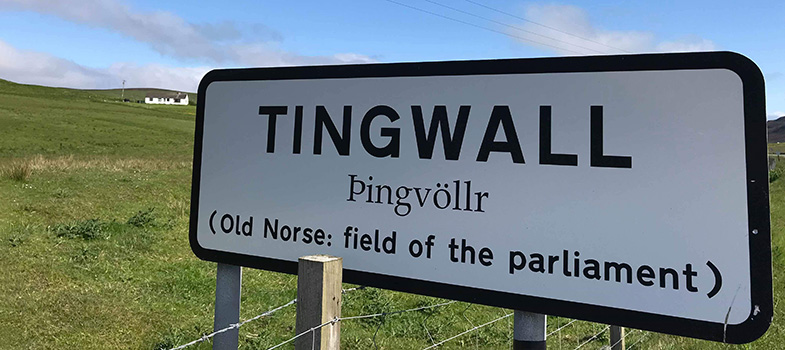1.5 Heid: current state provision
In 2001, the UK Government signed the Council of Europe's European Charter for Regional and Minority Languages [Tip: hold Ctrl and click a link to open it in a new tab. (Hide tip)] , an aspect which you will study in more detail in the ‘Politics’ section of this course. By signing this charter, the UK Government recognised Scots as a language, and the responsibility for implementing the terms of the Charter for the Scots language passed to the devolved adminstration in Scotland. Currently the Scottish Government supports Scots in the following ways:
- direct funding for the Scots Language Centre and Scottish Language Dictionaries;
- funding through Education Scotland for (presently) one Scots Language Coordinator;
- funding through the National Library of Scotland for the National Scots Scriever post;
- competitive funding through Creative Scotland for Scots language arts projects.
Following the commitment to Scots made by signing the Charter, the Scottish Government published a Scots Language Policy in 2015. Among other things, the policy recognised "Scots as one of the three historical indigenous languages of Scotland along with Gaelic and English" and acknowledged "the importance of recognising, promoting and developing the Scots language in all its regional varieties".
In terms of practical steps, the policy stated alongside other ambitions that the Scottish Government would endeavour "to create awareness amongst all stakeholder groups that Scots is one of the three historical indigenous languages of Scotland and should therefore be afforded equal respect" and encourage "all stakeholder groups to develop and implement Scots language policies".
Activity 8 
Following the discussion in the previous section, you have read here that the Scottish Government has developed a clear policy with a rationale and a range of recommendations that will support the establishment of Scots as the third indigenous language of Scotland. In this activity, you will engage with the rationale and aims laid out by the government for supporting Scots, and you will compare policy objectives with the arguments for and against Scots from section 1.4 Hert: how people feel about Scots.
Take some notes with your own views on the following questions. You will come across these aspects in more sections of the course and can revisit and refine what you have written here as you go through this course.
- Are there any aspects where the Scottish Government’s Scots policy rationale and the discussions in this unit, specifically in section 1.4, overlap?
- Where do both diverge entirely?
Here the relevant extract from the Scots language policy 2015:
Rationale
This section briefly lists the key reasons why the Scottish Government values and promotes the Scots language.
- The Scottish Government values the linguistic heritage of all of the people of Scotland and recognises Scots as an essential part of this.
- The Scottish Government recognises Scots as one of the three historical indigenous languages of Scotland along with Gaelic and English.
- The Scottish Government acknowledges the importance of recognising, promoting and developing the Scots language in all its regional varieties.
- The Scottish Government recognises the richness of the Scots language as expressed in song, poetry and literature.
- The Scottish Government regards Scots, in its written and spoken forms, as a valid means of communication.
- The Scottish Government recognises the important role that school education has in promoting the use of Scots.
Aims
The Scottish Government recognises that the Scots language is an integral part of Scotland's heritage, national identity and current cultural life. The Scottish Government, working with other partners in Scottish public and community life, will be guided by the aims below:
- to enhance the status of Scots in Scottish public and community life
- to promote the acquisition, use and development of Scots in education, media, publishing and the arts
- to encourage the increased use of Scots as a valid and visible means of communication in all aspects of Scottish life
(Scottish Government (2015) - Scots language policy: English version)
Answer
Here are some suggestions for possible answers to the questions posed in this activity. Your answers might be very different.
There is much overlap when it comes to the recognition of the validity of Scots language as a means of communication. Scots is seen as an equal language next to the other two indigenous languages of Scotland. The rationale, as well as pro-Scots arguments from this section, highlight that Scots is an important part of Scotland’s heritage due to the richness of the language expressed in many art forms. Scots is a long-standing part of community life in Scotland and is a language that exists in written and spoken form.
The views expressed in the rationale and in this section diverge when it comes to political views, as some critics appear to consider Scots a invented tool used by the Nationalist movement. Other critics worry that Scots is simply bad English and are worried that children will be exposed to the ‘wrong English’ in school when being introduced to Scots as a language
1.4 Hert: how people feel about Scots
